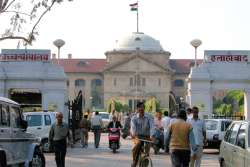Allahabad HC allows acquisition of land belonging to religious body for ‘public purposes’
In a significant development, the Allahabad High Court today ruled that a land in custody of a religious body can be acquired for a “public purpose” as it asked the Church of North India Association

In a significant development, the Allahabad High Court today ruled that a land in custody of a religious body can be acquired for a “public purpose” as it asked the Church of North India Association and NHAI to “work out modality” for “demolition or shifting” of a church for construction of a six-lane road.
“Once there is public purpose for which land in question has been acquired, invoking provision of National Highways Act, 1956, then no relief can be accorded to the petitioner,” the court said, disposing of the plea of the Church of North India Association which had challenged a August 17, 2012 notification by which four plots of land were acquired in Firozabad district for construction of a bypass connecting Agra with Etawah.
A division bench comprising Justices V K Shukla and M C Tripathi, however, in its December 19 order said that in view of Christmas festivities, the structures should not be demolished “for the period of one month” but thereafter the aggrieved party and the National Highway Authority of India (NHAI) should “work out modality” for “demolition or shifting” of the same.
The association had moved the court contending that the impugned notification “hurts the sentiments and religious conscience of the Christian community” which violated the “right to freedom of religion” and the “freedom to manage religious affairs” guaranteed under Articles 25 and 26 of the Constitution.
The petitioner had also argued that the acquisition of the land violated the Place of Worship (Special Provisions) Act which “safeguards all religious properties”.
The court refused to interfere in the petition challenging the acquisition of the land belonging to a church and a graveyard in western Uttar Pradesh for construction of the six-lane road.
It said that the Place of Worship (Special Provisions) Act only “bars any person from converting any place of worship of any religious denomination or different religious denomination” and that the “provision had been introduced to see that communal harmony is not disturbed and persons of one religious community may not take on the other”.
The bench accepted the plea made by the petitioner’s counsel that “it would be too harsh to demolish the church at this point of time, i.e. on Christmas eve and as such for a period of one month, demolition may not take place on the spot and thereafter, the petitioner in consultation with NHAI would see and ensure demolition/shifting of the church as well as of the graveyard”.
(With PTI inputs)